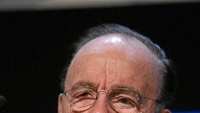TV executives in search of a business model
In the years prior to the digital transition, some TV executives surmised that once analog television was turned off, the industry would begin an intensive search for a new business model for the broadcast industry.
In less than three months since the transition was complete, that’s exactly what has happened.
Cable has always been considered a superior business model since it gets multiple revenue streams: subscription, advertising and some transactions. Broadcast TV has only one revenue source —advertising.

In the past year, with the global economic meltdown impacting television advertising sales, income is way down — estimated at about 10 percent — while production costs continue to rise. The crisis is forcing media executives to reexamine broadcasting’s business model.
News Corp, owner of the “New York Post” and “The Wall Street Journal” in the United States and the “London Times” and “Sun” newspapers in the UK, announced last week that only its American cable network — Fox — is profitable. The company’s income is down 30 percent.
“The last year has been one of the toughest we’ve faced in our history,” Rupert Murdoch, News Corp’s CEO, said in a conference call with Wall Street analysts. Then, Murdoch threw down the gauntlet that provoked a major debate with media executives through the industry.
“We intend to charge for all our news Web sites,” Murdoch told the analysts. To keep readers from simply shifting to free news Web sites, he said News Corp. would simply make its content “better and differentiate it from other people.”
The professional video industry's #1 source for news, trends and product and tech information. Sign up below.
Murdoch added that “quality journalism is not cheap, and an industry that gives away its content is simply cannibalizing its ability to produce good reporting.”
News Corp.’s COO Chase Carey then chimed in that the free-TV model is broken and needs to be fixed quickly. “We have an ad-supported business model that doesn’t work. We need to get value for our great event product like the NFL and ‘American Idol’,” Carey said. “We need to build new distribution models in a digital world that generate real value for our product.”
Jeff Zucker, the president of NBC Universal, agreed. He strongly noted after the resignation last month of Ben Silverman as head of programming for the broadcast network that NBC is now primarily a cable company. Silverman’s broadcast job will be taken by Jeff Gaspin, the executive that oversees NBC’s cable lineup.
Through the personnel shift, NBC Universal acknowledged further that the distinction between broadcast and cable is evaporating. There’s little real news there, only a continuation of Zucker’s aggressive policy to move NBC away from the traditional broadcasting business model.
Though Murdoch’s bold statement were targeted to News Corp.’s Web sites and its Internet activity, the move may also apply to broadcast television as well. As more and more viewers watch television online, the industry is nervous that viewers may expect programming to become free. It wants to protect its lucrative subscription model.
The TV Everywhere initiative pushed by Time Warner and Comcast attempts to extend the cable model to the Internet. It would make it possible for cable subscribers armed with a password to watch cable programming on the Internet. But it still requires viewers to buy a cable subscription. TV Everywhere is experimental right now and has not yet been proven to work.
Perhaps the lone network voice claiming that the broadcast model is still viable is Les Moonves, CEO of CBS. But even his own research director, David Poltrack, suggested that online video ads are potentially worth more than those on network television. Of course, that’s only potential, because digital advertising on the Internet is nowhere near the total value of on-air advertising.
Though Rupert Murdoch’s talk of charging for his digital programming online stoked much interest among economically shell-shocked executives last week, there’s no guarantee it will work either. In fact, such experiments on the Web have repeatedly failed in the past. His promise to make New Corp.’s content “better” remains to be seen.
The fact is that all television business models, including cable’s triple revenue streams, are under a huge threat posed by free programming available over the Internet. Viewers, feeling the effects of a troubled economy, are increasingly refusing to pay cable providers for subscriptions. If this trend continues, the entire business model for digital television could change.
